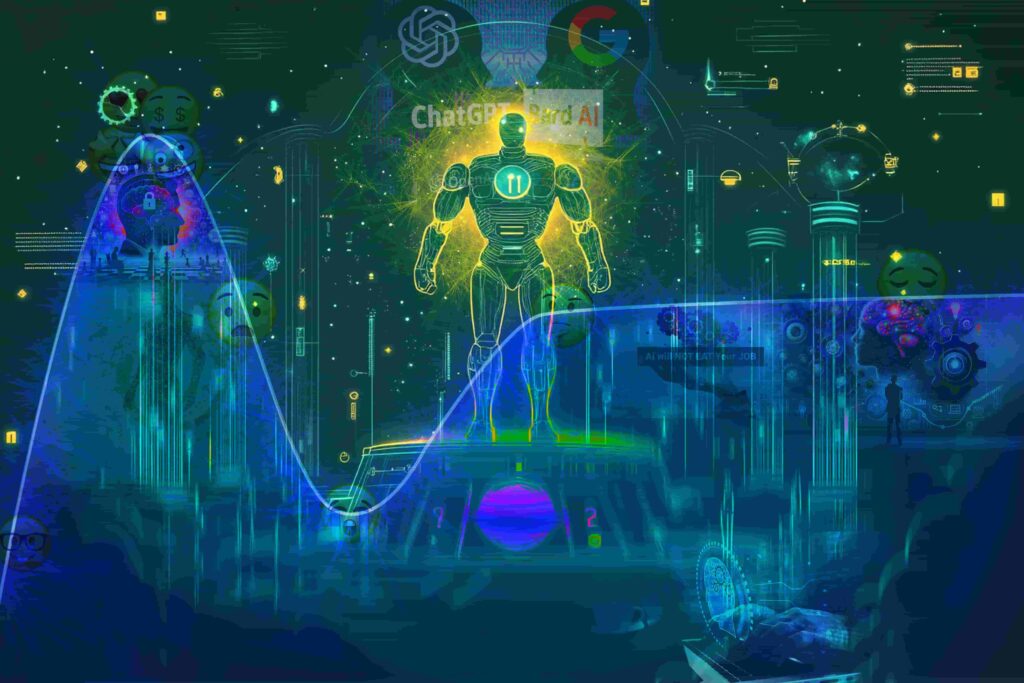Is The Era of Generative AIs Already Over?
Aug. 16, 2024. 4 mins. read.
8 Interactions
Generative AI's hype is waning as companies face costly disappointments, realizing that while it's a useful tool, it's far from the revolutionary force once feared.
As Wall Street begins to call AI’s bluff, have GPTs to date delivered a ‘killer app’?
First, excitement. Then, fear. Then boredom? Generative AIs and LLMs burst onto the scene with considerable fanfare. It wasn’t long before prophets of doom began declaring the end times for late-stage capitalism and the beginning of techno-fiefdoms that would take our jobs and remake our societies – for better or for worse.
Venture capital sent waves of backing to AI startups desperate to seize a piece of the new frontier for themselves. Formerly a niche interest of nerds who had taken psychedelics and saw the machinery of the mind, AI became the marketing buzzword, draping itself seductively over every sector in the economy.
The future, and the end, was nigh. Intellectual automation was on the brink of world dominion. No job was safe, no social structure secure – and what happened next would define the rest of our lives.
Except perhaps, it wouldn’t. Perhaps – unlike the PC, smartphones and social networks that were Big Tech’s last great inventions – LLMs and generative AI are struggling to move the needle quite the way we expected. Wall Street started to panic, and soon after so did everyone else. CEOs who had replaced parts of their workforce with GPT were suddenly wearing shocked pikachu faces that the output didn’t have consistent quality, and that customers do not like the feeling of being served by a machine.
We’ve had decades of films, books and sci-fi to warn us about the perils of abandoning our organic agency – and seeing the first glimmers of that in our real world has been a warning, a terrifying one for some. More simply: why am I paying for a service you’ve decided a GPT can do for me? I might as well just download my own.
This isn’t to say AI hasn’t had an impact, it has. My writer friends working on the content-farm base of the pyramid have struggled, as have my musician mates who chiefly trade in jingles and ditties. Only my most talented friends in graphic design have survived so far. Many creatives hacking out at a living at the base of the pyramid are finding work harder and harder to find. To them I say: don’t worry, your time will come again. It doesn’t matter how good AI gets – it still smells like AI. And people are already turning against it. We don’t mind when it’s used for the little things, but for anything that has value to us, or anything we pay for – we want a human.

People would rather read error-strewn human-made logically inconsistent rubbish than pristine AI copy devoid of true insight. And if you’re writing technical documents. Well – someone still needs to check the LLM hasn’t hallucinated that you’re meant to cut the blue wire not the red. Accountability matters. You can’t hold a generative machine accountable for anything; it doesn’t know what it said.
Practically, the generative AI train’s wheels are also grinding to a halt. Initially, vast amounts of data were acquired, and fed to competent models, and engineers got exponential progression in ability. Now the returns are diminishing fast.
Our carbon-based neural clusters are so dense that we can discern, judge and then perform tasks we have never encountered before – and we can do it pretty damn well. We just can’t fit that many more transistors on a chip, and we can’t feed an AI more data in a whole lifetime than we absorb in a single day through our five senses. The gulf in class between us and our baby-models is too vast, no matter how much corporations with a vested interest in saving labour-costs want to convince us otherwise.
Besides, these models are expensive. Fearsomely, ridiculously expensive. Nvidia briefly overturned all its rivals trying to build bespoke corporate AIs by selling the shovels required to make them. The race for ‘compute’ is as scary as it is damaging to the bottom line. Invest now, save and earn later – that’s the basic principle of investment, but with AI the balance is completely out of whack, with trillions invested into models that, to date, have failed to deliver any sort of ‘killer app’.
Indeed, the killer app is probably already here: in the form of GPT’s ability to summarise and recapitulate difficult documentation. I’m coding a game right now – GPT is a godsend, in education as well as application. As an assistant, it’s a delight. Yet perhaps that’s where the generative AI advance ends for now. It’s a useful time-saver, and Skynet’s rise to power is still far away. White-collar workers may indeed be safe. I’ve already seen writing jobs re-emerge en masse as CEOs begin to realise their mistake. It seems that the collective AI mania has begun to abate, and by treating our new tool as just that, a handy new tool, we’ll all be much the better for it.
Let us know your thoughts! Sign up for a Mindplex account now, join our Telegram, or follow us on Twitter.


.png)

.png)


.png)








0 Comments
0 thoughts on “Is The Era of Generative AIs Already Over?”